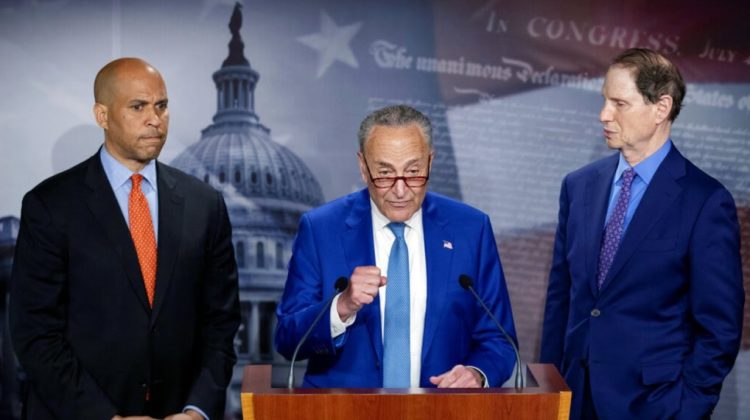
From left to right: Senators Booker, Schumer, and Wyden — the CAOA sponsors. Image credit: Denver7.
More than 90% of Americans believe cannabis should be medically or recreationally legal, according to the Pew Research Center. Despite this, it remains federally illegal. Consequently, three Democratic Senators are pushing for the decriminalization of cannabis nationwide through the Cannabis Administration and Opportunity Act (CAOA).
NEW: As more states continue to legalize marijuana, an overwhelming share of U.S. adults (91%) say either that marijuana should be legal for medical and recreational use (60%) or that it should be legal for medical use only (31%). https://t.co/inaE5EU09t pic.twitter.com/MBsmCZmkfY
— Pew Research Center (@pewresearch) April 16, 2021
Post from @pewresearch on Twitter.
What is the CAOA’s Purpose?
The CAOA is a comprehensive piece of cannabis reform legislation that would legalize and regulate cannabis at the federal level while allowing states to determine their own cannabis laws. According to the bill’s discussion draft, this would mean that states could not stop businesses from transporting cannabis products across their borders to other states where cannabis is legal.
Additionally, the CAOA would effectively remove cannabis from the federal list of controlled substances, explains the Discussion Draft. The next step would be to transfer jurisdiction over cannabis from the Drug Enforcement Administration (DEA) to the Food and Drug Administration (FDA), the Alcohol and Tobacco Tax and Trade Bureau (TTB), and the Bureau of Alcohol Tobacco Firearms and Explosives (ATF). The FDA would be responsible for regulating the manufacturing and marketing of cannabis products. Furthermore, the ATF and TTB would collect taxes; enforce tax regulations; and track cannabis products to prevent illicit distribution and to ensure compliance with the law; and protect public health.

Repairing Harm
The CAOA also aims to reverse harm done to communities of color who’ve suffered most from the War on Drugs. The bill would gradually implement a federal sales tax, similar to the sales tax on alcohol and tobacco. The tax on cannabis products would be 10% the first year, and the eventual goal is to increase the sales tax to 25% for big businesses within five years. Officials would then use that revenue for community investment, e.g., the Opportunity Trust Fund. This fund would invest in areas that have been disproportionately harmed by the racially motivated enforcement of the War on Drugs.
According to the proposed bill, the CAOA would automatically erase federal nonviolent cannabis-related charges. Furthermore, it allows for individuals currently serving time in federal prison for nonviolent cannabis crimes to petition a court for resentencing. In addition to this, the federal government would no longer be able to discriminate against cannabis users seeking federal housing, food, or health benefits.
According to The New York Times, it would be up to the states to determine cannabis legalization, but there would no longer be federal prohibition.

Who are the Senators Behind the Bill?
The CAOA’s sponsors are Sen. Cory Booker, D-NJ, Sen. Ron Wyden, D-OR, and Senate Majority Leader Chuck Schumer, D-NY. These senators introduced the bill on July 14th, 2021, and accepted feedback from the public and stakeholders until September 1st.
When presenting the draft of the bill at a press conference on July 14th 2021, Schumer said, “we are all joining together to release draft legislation to end the federal prohibition on cannabis. This is monumental because, at long last, we are taking steps in the Senate to right the wrongs of the failed War on Drugs,” reports ABC’s Denver7.
The three senators have said that federally decriminalizing cannabis is extremely important now. This is because many states are now beginning to legalize both medical and recreational use.
Sen. Wyden also made a statement at the press conference saying, “cannabis prohibition, a key pillar of the failed War on Drugs, has caused substantial harm to our communities and small businesses, especially for communities of color.”
Wyden has been a long-time supporter of cannabis drug reform. In fact, he even sponsored another cannabis descheduling bill in 2017, the Marijuana Revenue and Regulation Act (MRRA). The MRRA aimed to remove cannabis from the list of controlled substances. The bill also wanted to establish requirements for the taxation and regulation of cannabis products. The MRRA was first introduced to Congress on March 30th, 2017; however, the bill died in a previous session of Congress, according to GovTrack, and independent legislation tracking source.
Due to the controversy surrounding cannabis use, the bill will be difficult to pas. That is because it needs at least 60 votes in the Senate. This would likely have to include all 50 democrats and at least 10 Republicans, according to intelligence source, JD Supra.
Where Does the Bill Stand in Congress?

As of September 2021, lawmakers have not yet formally introduced the CAOA to Congress. It is still a discussion draft with no real concrete updates about when, or if, the House of Representative will vote on it and make it to the Senate floor, then the President’s desk. However, the Marijuana Opportunity Reinvestment and Expungement (MORE) Act, a similar bill that also advocates for decriminalizing cannabis, was passed by the House Judiciary Committee on September 30th, 2021 with a 26-15 vote.
Although the CAOA has not yet made it to Congress, and due to the recent approval of the MORE Act, combined with the public support for cannabis legalization; it is clear that there is a chance that the CAOA could eventually make it to the President’s desk.



Leave a Reply